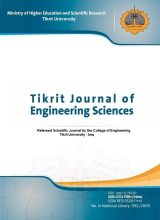Abstract
Nano-refrigerant is announced to become an excellent refrigerant, which often improves heat transfer efficiency in the cooling systems. Different materials can be applied to be suspended in traditional coolants in the same way as nanoparticles. In this comprehensive research, mathematical modeling was used to investigate the effect of suspended nanoparticles (Al2O3, CuO, SiO2 and ZnO) on 1,1,1,2-Tetrafluoroethane, R-134a. The thermal conductivity, dynamic viscosity, density and specific heat capacity of the nano-refrigerant in an evaporator pipe were investigated. Compared to conventional refrigerants, the maximum increase in thermal conductivity was achieved by Al2O3/R-134a (96.23%) at a volume concentration of 0.04. At the same time, all nano-refrigerant types presented the same viscosity enhancement of(45.89%) at the same conditions. These types of complex thermophysical properties have enhanced the heat transfer tendencies in the pipe. Finally, the nano-refrigerant could be a likely working fluid generally used in the cooling unit to improve high-temperature transfer characteristics and save energy use.
Keywords
Nano-refrigerant
Refrigeration system
Thermo-physical Properties
Tube Evaporator
